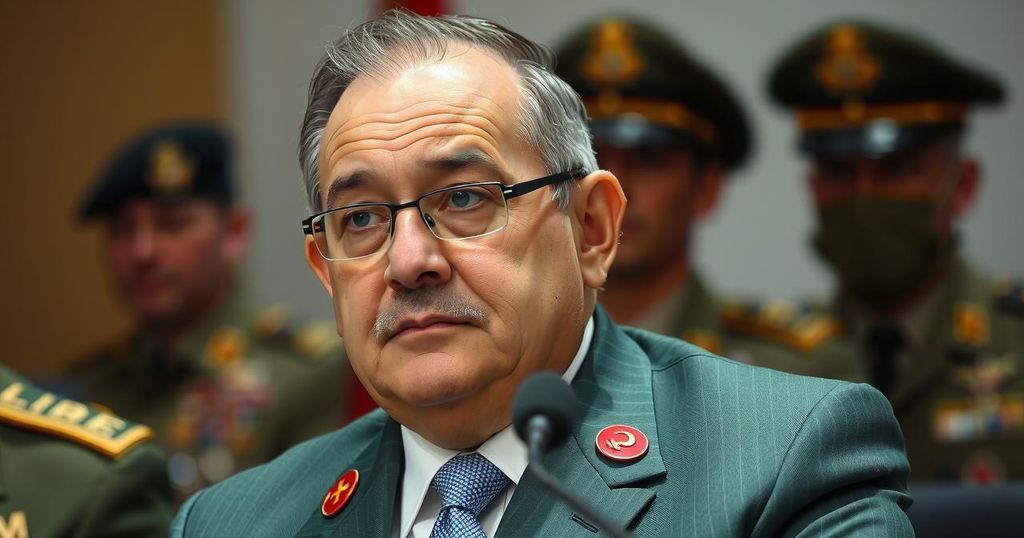Libyan PM Dabaiba Opposes Russian Military Expansion in Libya

Libyan Prime Minister Abdul Hamid Dabaiba has resisted Russia’s attempts to expand military presence in eastern Libya, asserting the country will not serve as a battleground for international disputes. This resistance follows the transfer of military equipment by Russian forces from Syria amid ongoing conflicts in Libya. Dabaiba’s stance emphasizes national sovereignty and has emerged alongside increasing U.S. pressures over governance issues in Libya.
Libya’s Prime Minister Abdul Hamid Dabaiba has publicly denounced Russia’s recent efforts to bolster its military presence in eastern Libya, characterizing such maneuvers as detrimental to the nation’s sovereignty. Dabaiba articulated his concerns regarding the transformation of Libya into a battleground for international conflicts, emphasizing, “We have concerns about moving international conflicts to Libya, and that it will become a battlefield between countries.” He reinforced the notion that Libya should not serve as a chessboard for global powers, invoking a strong sense of national pride in his remarks.
The situation stems from reports of Russian military equipment being repositioned from Syria’s Tartus naval base and Hmeimim airbase to eastern Libya, where a rival faction led by military leader Khalifa Haftar has historically received Russian support. Dabaiba’s government is adamant against the acceptance of Russian arms to avert further complications in Libya’s ongoing internal strife, stating that “no one with an ounce of patriotism wants a foreign power to impose its hegemony and authority on the country and the people.” His outreach includes dialogues with the Russian ambassador to underscore his government’s objections.
This resistance emerges amid a backdrop of heightened tension following the Assad regime’s fall in Syria, which prompted Russia to enhance its military operations in regions of strategic interest, including Libya. Analysts, such as Jalel Harchaoui from the Royal United Services Institute (RUSI), indicate that Dabaiba’s response represents a significant shift in the dynamic between Libya’s factions and foreign actors, suggesting that this stance may be an attempt to garner favor with Western allies amid increasing U.S. scrutiny over corruption contentions within Libya’s leadership.
The U.S. government has begun exerting economic pressure on key Libyan institutions, notably suspending dollar transactions by the Libyan Central Bank until an independent auditing body is appointed. The transparency initiative aims to investigate financial discrepancies, potentially exposing illicit oil trafficking and ties between Libyan officials and Russian interests, leading to possible sanctions against implicated individuals.
Since the ousting of dictator Muammar Gaddafi in 2011, Libya has been engulfed in conflict, marked by a division between the United Nations-recognized government in Tripoli and a rival regime in the east supported by Khalifa Haftar. Russia’s involvement in Libya has significantly increased, particularly following events in Syria, where military strategies and resources are being redirected. The geopolitical significance of Libya as a potential military theater for global powers raises fresh concerns for its leadership, particularly under the auspices of U.S. scrutiny over corruption and governance issues.
In conclusion, Prime Minister Abdul Hamid Dabaiba’s rejection of Russian military reinforcements highlights Libya’s precarious position in international politics and reflects growing national sentiment against foreign intervention. His statements signal a potential recalibration of alliances in response to escalating U.S. involvement aimed at ensuring accountability within the fractured Libyan landscape. Consequently, Libya’s future may hinge on its leadership’s ability to navigate complex foreign relations while prioritizing its sovereignty and internal stability.
Original Source: www.theguardian.com








